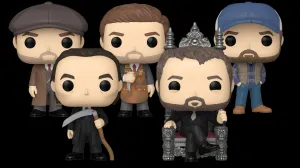DC’s Blue Beetle has had a winding path through the franchise’s most turbulent times. Originally conceived as an HBO Max feature, the vision that the director Ángel Manuel Soto presented to Warner Bros. and DC Films impressed executives so much that they decided to bump Blue Beetle up to a theatrical release. However, when they made that change, few could’ve expected Blue Beetle to wind up in such precarious middle-ground: the franchise era built by Zack Snyder is ending, and James Gunn and Peter Safran will be starting over again with DC Studios and a whole new slate of films. Stranded in the middle of that transition is Blue Beetle, whose future in the franchise may very well hinge on response to this film.
Videos by ComicBook.com
So, is Blue Beetle worthy enough to represent the new DC Universe brand? The answer is that the film is a promising departure from the previous DCEU aesthetic – if not a bit too safe and formulaic with its Marvel-style superhero origin story.
The plot of Blue Beetle focuses on Jaime Reyes (Cobra Kai‘s Xolo Maridueña), a college student who returns home after graduating to find his family in dire straits: they’ve lost their business, are about to lose their home, and Jaime’s father’s health is declining fast. To help out, Jaime joins his sister Milagro (Belissa Escobedo) doing odd custodial jobs – one of which brings him into the orbit of the Kord family, the wealthy industrialists that own Kord Industries.
When Jaime tries to get work (and a date) from Ted Kord’s daughter Jenny (Bruna Marquezine), she ends up having to entrust him with Kord Indsutries’ most valuable (and dangerous) asset: the Scarab. Jaime and his family can’t resist the urge to examine the strange object, inadvertently causing the Scarab to activate and choose Jaime as its host. While Jaime just wants to get his normal life back, his status as the Scarab’s host makes him a target of Jenny’s ruthless and cunning aunt, Victoria Kord (Susan Sarandon), who wants the Scarab to power her own army of super-soldiers, by combining her O.M.A.C. exo-suits with the Scarab’s limitless energy.
Blue Beetle is, as stated, a throwback to superhero origin story films of the 2000s – albeit with much better production values. Ángel Manuel Soto’s directorial vision is a solid enough mix of lavish color and gritty urban aesthetic to warrant the theatrical presentation, with action and set pieces that are on par with some fan-favorite superhero blockbusters. The pacing of the film is very by-the-numbers with its three-act, three-battle sequencing, and will be overly familiar to anyone who has watched this genre before. While there are major standout moments, visually speaking, there are also smaller moments between the action set pieces where the blocking and camera work make it look like Soto was working on an HBO Max series, rather than a feature film. The direction is a bit uneven, but overall the film is an impressive jump for Soto, who at the very least proves that he’s ready for this level of blockbuster film work.
The script by Gareth Dunnet-Alcocer is strong with its thematic resonance and heart (family and duty), giving Blue Beetle a deeper emotional core that distinguishes it from the pack of other superhero films out there. There are cultural hallmarks all over the story, dialogue, and themes of the film, which make it feel truly authentic as the first of the genre to be led by a Latino character/actor, and it works to the film’s favor in many ways. That said, there are also a lot of times that Blue Beetle plays fast-and-loose with basic logic, as the phenomenon of an alien warrior doing battle with hi-tech soldiers in an urban city doesn’t seem to be a big deal for the locals, cops, emergency services, etc. Thankfully, at this point it’s easy to accept superhero films simply side-stepping logic in favor of spectacle – just don’t think too hard about any turns of the story and you’ll be okay.
What really pushes Blue Beetle over the line of being a promising DC movie release is the cast. Xolo Maridueña takes the Jaime Reyes role and owns it entirely – and the actor definitely deserves to keep playing Blue Beetle going forward, as DC Studios would only benefit. The same holds true for the version of the Blue Beetle superhero that Soto and Saridueña have built here: from the design of the Blue Beetle armor to Jaime and Scarab’s relationship – to the larger mythos of the “Blue Beetle” mantle and its history – this movie lays some great foundation for DC Studios to build upon.
The supporting cast of Blue Beetle deserves just as much praise. Susan Sarandon is almost effortless in her portrayal of a good villain, delivering mania and menace as Victoria Kord with such straightfaced matter-of-factness that it sometimes is hard to remember just how crazy (or hokey) it all is. Raoul Max Trujillo (Mayans M.C.) is even more nuanced and surprising as Ignacio Carapax/OMAC, as the script (and actor) turns the usual superhero movie henchman into a much deeper story of loss and grief.
Bruna Marquezine feels like she has a lot to offer as Jenny Kord, even if this film is just scratching the surface of the character and her history. Jaime’s family (actors Elpidia Carrillo, Belissa Escobedo, Adriana Barraza, and Damián Alcázar) carry a considerable amount of weight during points in the movie – and George Lopez is a scene-stealing delight as Jaime’s uncle/tech-expert, Rudy. This vision of Jaime Reyes and his world is one that definitely deserves to continue intact, as it is the true gem of worth in this middle child of a film.
If DC fans are hoping for a solid, uncomplicated (no continuity knots), and most of all fun DC superhero movie that even teens and kids can enjoy – Blue Beetle may very well be the first DC film in a decade that can deliver on all those fronts. That is an achievement in its own right.
Rating: 3.5 out of 5
Blue Beetle is in theaters now.








